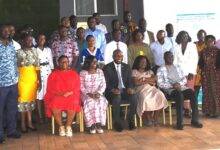
The World Health Organisation, (WHO) has commended Ghana for achieving the elimination of Human African Trypanosomiasis as a Public Health Problem.
This brings the total number of eliminated Neglected Tropical Diseases in the country to three, which includes Trachoma and Guinea Worm.
The certificate was given at the World Neglected Tropical Diseases (NTDs) day celebration held in Adeiso in the Eastern Region.
The day is to raise awareness on these diseases worldwide and in particular Ghana as a reminder to continue working together to reduce the negative impact of these diseases.
WHO’s Representative, Ms Sharmila Lareef-Jah said the country’s achievements underscore the positive impact of increased political commitment and government investments in the fight against NTDs, “It is evident that with sustained efforts, more NTDs can be targeted for elimination”.
She said the WHO would continue to emphasise the importance of health days in raising awareness about various diseases and advocate for support from communities and stakeholders.
According to her, there has been remarkable progress in controlling and eliminating Neglected Tropical Diseases (NTDs).
“By December 2022, 47 countries had successfully eliminated at least one NTD, with more countries working towards achieving similar outcomes. In 2022 alone, eight countries were certified for eliminating one NTD, showcasing meaningful progress in this area,” she said.
Ms Lareef-Jah said despite advancements, NTDs remained a significant public health challenge due to their complex epidemiology, often involving vector-borne transmission and links to environmental conditions.
“The effects of climate change further complicate the control and elimination of these diseases. Additionally, financial investment in addressing NTDs has been limited, posing a barrier to progress in this area,” she said.
She said WHO has played a crucial role through the Expanded Program to Eliminate NTDs (ESPEN), providing operational and financial support to endemic countries.
She explained that WHO’s support has focused on improving health information systems, strengthening overall health systems, and building capacity in supply chain management.
“These efforts are central to addressing the challenges posed by NTDs and advancing the global fight against these diseases,” she said.
The Director General of the Ghana Health Service (GHS), Dr Patrick Kuma- Aboagye said NTDs caused significant morbidity and mortality globally.
He said NTDs are a group of an ancient disease that threatens about 1.7 billion people living in the poorest and most marginalised communities in the world.
According to him, every district in the country is endemic with at least two NTDs, adding that most of the diseases do not kill but produce bad effects, including severe disfigurement, disability, and blindness on patients.
He said the diseases were found in communities with strong association with poverty, thus, people were often affected by more than one disease.
Dr Kuma-Aboagye called for stakeholder collaboration to help tackle extreme poverty and help create awareness.
“For better integration of NTDs activities into the healthcare system, a primary health care approach was essential while maintaining close interaction between programmes to bring multiple health benefits to people in need,” he said.
The Eastern Regional Director of Health Service, Dr Winfred Ofosu, said patients continue to report Yaws, Leprosy, Onchocerciasis, Buruli Ulcer, Soil Transmitted Helminths, Urinary Schistosomias, Lymphatic Filariasis and snakebites which are all prevalent in the Upper West Akim District.
He said the GHS through the NTD Programme was implementing interventions such as case management, preventive chemotherapy to control, eliminate and eradicate these diseases in the country.
FROM AGNES OPOKU SARPONG, ADEISO







